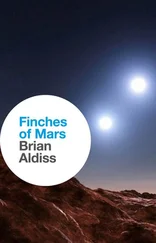Brian Aldiss - White Mars
Здесь есть возможность читать онлайн «Brian Aldiss - White Mars» весь текст электронной книги совершенно бесплатно (целиком полную версию без сокращений). В некоторых случаях можно слушать аудио, скачать через торрент в формате fb2 и присутствует краткое содержание. Год выпуска: 1999, ISBN: 1999, Издательство: Little, Brown UK, Жанр: Фантастика и фэнтези, на английском языке. Описание произведения, (предисловие) а так же отзывы посетителей доступны на портале библиотеки ЛибКат.
- Название:White Mars
- Автор:
- Издательство:Little, Brown UK
- Жанр:
- Год:1999
- ISBN:0-316-85243-0
- Рейтинг книги:5 / 5. Голосов: 1
-
Избранное:Добавить в избранное
- Отзывы:
-
Ваша оценка:
- 100
- 1
- 2
- 3
- 4
- 5
White Mars: краткое содержание, описание и аннотация
Предлагаем к чтению аннотацию, описание, краткое содержание или предисловие (зависит от того, что написал сам автор книги «White Mars»). Если вы не нашли необходимую информацию о книге — напишите в комментариях, мы постараемся отыскать её.
White Mars — читать онлайн бесплатно полную книгу (весь текст) целиком
Ниже представлен текст книги, разбитый по страницам. Система сохранения места последней прочитанной страницы, позволяет с удобством читать онлайн бесплатно книгу «White Mars», без необходимости каждый раз заново искать на чём Вы остановились. Поставьте закладку, и сможете в любой момент перейти на страницу, на которой закончили чтение.
Интервал:
Закладка:
Did he recognise me from my previous visit? Certainly he came over and said hello to me in the friendliest way.
Thorgeson briefed us on what we were going to see. In fact, he admitted, we could see very little. The science institution comprised two sorts of people. One was a somewhat monastic unit, where male and female scientists thought about what they were doing or what they might do, free from pressures to produce—in particular the pressure to produce “Big Science”. The other unit comprised people actually doing the science. This latter unit was still adjusting the equipment that, it was hoped, might eventually detect Rosewall’s postulated Omega Smudge.
As we were being shown around, Thorgeson explained that their researches were aimed at tackling the mystery of mass in the universe. Rosewall had made an impressive case for the existence of something called a HIGMO, a hidden-symmetry gravitational monopole. The team was running a pilot project at present, on a relatively small ring, since the density of HIGMOs in the universe remained as yet unknown. The ring lay at the rear of the science unit, under a protective shield, we were told.
One of the crowd asked the obvious question of why all this equipment and this team of scientists were shipped to Mars at such enormous expense.
Thorgeson looked offended. “It was Rosewell’s perception that you needed no expensive super-collider, just a large ring-shaped tube filled with appropriate superfluid. Whenever a HIGMO passes through this ring, its passage will be detected as a kind of glitch appearing in the superfluid. Any sort of violent activity outside the tube would ruin the experiment.”
I found myself asking how HIGMOs could manage to pass through the ring. He seemed to look hard at me before answering, so that I felt silly.
“Young lady, HIGMOs can pass clean through Mars without disturbing a thing, or anyone being any the worse for it.”
Someone else asked, “Why not build this ring on the Moon?”
“The Moon—we’re too late for that! Tourist activities, mining activity, the new transcore subway … The whole satellite shakes like a vibrator in a wasps’ nest.”
Turning his gaze on me, he asked, “You understand this?”
I nodded. “That’s why you’re out here. No wasps’ nests.”
“Full marks.” He came and shook my hand, which made me very uncomfortable. “That’s why we’re out here. It’s fruitless to pursue the Smudge on Earth or on Luna. Far too much racket. The Omega Smudge is a shy beast.” He chuckled.
“And if you capture this Smudge, what then?” asked one of the group, Helen Panorios, the YEA woman with dyed purple hair and dark complexion.
“It holds the key to many things. In particular, it will tell us just how the microverse relates to the macroverse, giving us the precise parameters for the dividing line between the small-scale quantum world of atoms and fundamental particles, and the larger-scale classical world of specks of dust upwards to galaxies and so on. I take the view of current “hard science” that these parameters should also tell us how the exterior universe relates to human consciousness. The detailed properties of the universe seem to be deeply related to the very existence of conscious observers—observers maybe like humans, maybe a more effective species which will supersede us. If so, then consciousness is not accidental, but integral. At last we’ll have a clear understanding of all existence.”
“So you hope,” ventured a sceptical voice.
“So we hope. When the ships come back and we can obtain more material, we expect to build a superfluid ring right around the planet. Then we’ll see.”
“Now we see through a glass darkly…” said Helen, admiringly.
“We don’t quote the Bible much here but, yes, more or less.”
A man who had already asked a question enquired rather sneeringly, “What exactly is this key between the large and small you mention? Isn’t human consciousness just a manifestation of the action of the quantputers in our heads?”
“That may well be true in principle, but we can’t proceed without knowing some important physical parameters more exactly, most particularly what’s labelled the HIGMO g-factor, whose value is completely unknown at present—let’s call it ‘the missing-link of physics’.”
“So what happens when you find it? Will the universe come to an end?”
Jon Thorgeson laughed to the extent of exciting the deep lines in his cheeks. He said that life for the majority of people might go on as usual. But even if the universe did end—well, he said, to make a wild guess, the probability was that there were plenty of other universes growing, as he put it, on the same stem. Mathematics indicated as much.
He came to a halt in the middle of a corridor, and our group halted with him and gathered round as he talked.
“As you know, stars keep going by exothermic fusion of hydrogen into helium-4. When the core hydrogen is almost used up, gravitational contraction starts. The consequent rise in temperature permits the burning of helium. In our universe, nucleosynthesis of all the heavier elements is achieved by this continued process of fuel exhaustion, leading to contraction, leading to higher central temperatures, leading to a new source of fuel for the sustaining nuclear energy.
“But in our universe there are what in lay terms we may call strange anomalies in this process. For instance, unless nucleosynthesis proceeded resonantly, the yield of carbon would be negligible. By a further anomaly, it happens that the carbon produced is not consumed in a further reaction. So we live in a universe with plentiful carbon and, as you know, carbon is a basic element for our kind of life.
“I wouldn’t like my boss to hear me saying this, but—who knows?—in a neighbouring universe, these strange anomalies may not occur. It might be entirely life-free, without observers. Or maybe life takes another course and is, say, silicon-based. Such possibilities will become clearer if we can get the tabs on our Smudge.”
One of our group asked if it would be possible for us to enter another universe, or for something from another universe to enter ours.
The lines on Thorgeson’s face deepened in amusement. “There we venture into the realms of science fiction. I can’t comment on that.”
At the end of our tour, I managed to speak to Thorgeson face to face. I told him that many of the people in the domes, particularly the YEAs, were interested in science but did not understand what the particle physicists were working at. Indeed, the scientific team were regarded as being rather secretive.
Lowering his voice, he said that there was dissension in the scientific ranks. The issues were complex. Many men and women on the team did not see the Omega Smudge as worth pursuing, and favoured more practical concerns, such as establishing a really efficient comet- and meteor-surveillance system. On the other hand… Here he paused.
When I prompted him to continue, he said that practical goals were for people without vision—clever people, but those without vision.
“Was Kepler being practical when, in the middle of a war, he sat down and computed the orbits of planets? Certainly not. Yet those planetary laws of his have eventually brought us here. That’s pure science. The Smudge is pure science. I’m not very pure myself—said with a sly laughing glance at me—“but I support pure science.”
Since I understood those sly glances, I asked him boldly if he would visit the domes and lecture us on the subject?
“Want to come and have a drink with me and talk it over?”
“I have to keep with my group. Sorry.”
Too bad. You’re an attractive lady. Korean, are you? We’re a bit short of adjuncts to living over here. Monastic is what we are.”
Читать дальшеИнтервал:
Закладка:
Похожие книги на «White Mars»
Представляем Вашему вниманию похожие книги на «White Mars» списком для выбора. Мы отобрали схожую по названию и смыслу литературу в надежде предоставить читателям больше вариантов отыскать новые, интересные, ещё непрочитанные произведения.
Обсуждение, отзывы о книге «White Mars» и просто собственные мнения читателей. Оставьте ваши комментарии, напишите, что Вы думаете о произведении, его смысле или главных героях. Укажите что конкретно понравилось, а что нет, и почему Вы так считаете.










